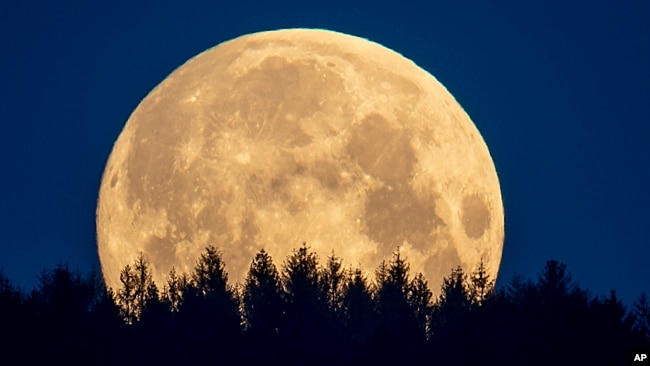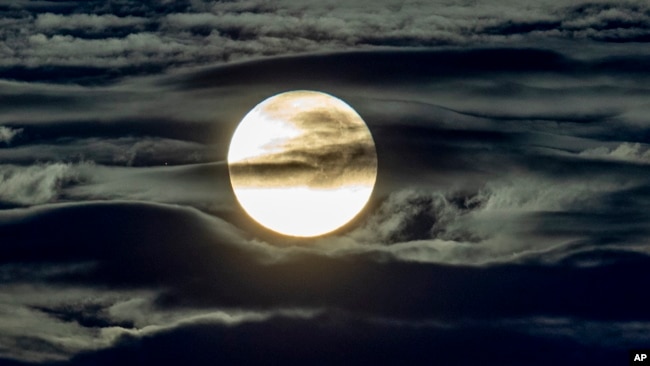満月と睡眠の関係
大好きなお月さま🌒💛
2020年5月7日(木)、ドイツ・フランクフルト近郊のタウヌス地方の木々の陰に沈む満月。
アメリカで見た白昼の満月がこんなに大きかったのを思い出しました。
その満月が睡眠に影響を与えていたなんて!!!
びっくりです。
さぁ、その研究に迫りましょう。
今日のVOAニュース、
Let's get started!!!
新しい研究は、満月が睡眠に影響を与えると示唆
New Research Suggests Full Moon Can Affect Sleep
January 31, 2021
満月を経験したように、最近明るい夜空に気づいたかもしれません。NASAは、 the Wolf Moonウルフムーンと呼ばれる出来事を報告しました、それは木曜日の午後に始まり、土曜日の午前中に終了しました。しかし、満月までの数日間、個人的な睡眠パターンに何か変化はありましたか?
最新の満月が始まると同時に、満月が人間の睡眠サイクルに影響を与えることを示唆する新しい研究が発表されました。研究者は、満月に至るまでの夜は、太陽が沈んだ後利用可能なより多くの自然光を持っていることを確認しました。
新しい研究では、満月の前の数日間は、人は夕方になると眠りにつくのが遅くなり、睡眠時間が短くなることがわかりました。
この結果は、出版物Science Advancesに掲載された研究で報告されました。研究は、ワシントン大学の生物学教授ホラシオ ・ デ ・ ラ ・ イグレシアによって主導されました。

2020年5月7日(木)、ドイツ・フランクフルト近郊のタウヌス地方の木々の陰に沈む満月。
「データを見たとき、それはそこにあったのです - 我々が全くそのパターンを期待していなかったものです、」とデ-ラ-イグレシア氏は、調査結果についてのビデオで述べています。彼は、この研究が人の睡眠覚醒サイクルは月が通過する変化と "同期 "されている明確な証拠を提供したのだと述べています。
月は地球を周回するのに27.3日かかりますが、新月から新月へのフルサイクルを完了するには29.5日かかります。新しい研究では、月が少なくとも全体で29.5日周期で進行すると、被験者の睡眠パターンが測定されました。いくつかの被験者は、2つの月のサイクルを通してテストされました。
平均して、研究に関わった人々の眠りは、満月の前の夜に約52分少なくなりました。彼らはまた、ベッドにいくのも約30分遅くなりました。研究は、人々が最も遅い就寝時間と最短の睡眠量だったのは、満月の3~5日前だったことを示しました。
「私はこの研究の被験者の一人となりましたが、自分のデータを振り返ってみると、自分の睡眠がどれだけ変わったか信じられませんでした」とデ・ラ・イグレシア氏は語っています。
さまざまな分野での睡眠への影響
デ・ラ・イグレシア氏のチームや他の研究グループによる過去の研究では、電気へのアクセスが睡眠に明確な影響を与えることが示されています。そこでチームは、この要素を研究に取り入れました。
研究には、アルゼンチンのトバ先住民の3つの異なるコミュニティに住む98人が参加しました。第1の農村部のコミュニティでは、電気のアクセスが全くなく、第2のコミュニティでは電気のアクセスが限られていました。第3のコミュニティは、より人口の多い地域にあり、完全に電気を利用できる状態でした。
睡眠データは、手首のモニターを通して個人から電子的に収集されました。研究チームは、この方法は、ユーザーが報告した睡眠データのみに依存していたいくつかの過去の研究よりも、より効果的なデータをもたらしたと考えていると述べています。
 2020年9月2日、ドイツ・フランクフルト郊外で雲に囲まれて満月が輝く。(AP Photo/Michael Probst)
2020年9月2日、ドイツ・フランクフルト郊外で雲に囲まれて満月が輝く。(AP Photo/Michael Probst)
先住民のコミュニティに加えて、研究者たちは、ワシントン州シアトル地域の大学生464人の睡眠データも調査しました。そのデータは別の研究のために収集されていました。研究者は、学生からの睡眠データで同じ月周期のパターンを発見したと述べています。
「効果は電気へのアクセスがないコミュニティでより強固であるが、効果は電気のあるコミュニティでも示されている」とデ・ラ・イグレシア氏は述べています。
科学者たちは、被験者の睡眠パターンの変化の他の可能性のある原因を説明するのに役立つさらなる研究が必要であると言います。そのような原因には、個人の生物学的な違いや、コミュニティ内の社会的なパターンが関係している可能性があります。
New Research Suggests Full Moon Can Affect Sleep
 The January full moon, known as Wolf Moon, rises on Rehoboth Beach Jan. 28, 2021. (Hai Do)
The January full moon, known as Wolf Moon, rises on Rehoboth Beach Jan. 28, 2021. (Hai Do)
You may have noticed brighter night skies recently as we experienced a full moon. NASA reports the event, called the Wolf Moon, began Thursday afternoon and ended Saturday morning. But did you notice any changes in your personal sleep patterns in the days leading up to the full moon?
As the latest full moon was beginning, a new study was released suggesting that a full moon can affect human sleep cycles. Researchers confirmed that the nights leading up to a full moon have more natural light available after the sun goes down.
The new research found that in the days before a full moon, people go to sleep later in the evening and sleep for shorter periods of time.
The results were reported in a study appearing in the publication Science Advances. The research was led by biology professor Horacio de la Iglesia of the University of Washington.
“When we looked at the data it was right there - we didn’t expect that pattern at all,” de la Iglesia said in a video about the findings. He said the study provided clear evidence that a person’s sleep-wake cycle is “synchronized” with changes the moon goes through.
The moon takes 27.3 days to orbit Earth, but it takes 29.5 days to complete a full cycle from New Moon to New Moon. The new study measured the sleep patterns of test subjects as the moon progressed through at least one whole 29.5-day cycle. Some subjects were tested through two moon cycles.
On average, people involved in the study slept about 52 minutes less on nights before a full moon. They also went to bed about 30 minutes later. The research showed that people had the latest bedtimes and the shortest amount of sleep during the nights that were three to five days before a full moon.
“I became one of the subjects of the study and when I looked back on my own data I could not believe how much my sleep changed,” de la Iglesia said.
Effect on sleep in different areas
Past studies by de la Iglesia’s team and other research groups have shown that access to electricity has a clear effect on sleep. So the team included this element in their research.
The study involved 98 individuals living in three different communities of Toba indigenous people in Argentina. Each community had different access to electricity. One rural community had no electricity access, while a second had only limited access. A third community was in a more populated area and had full access to electricity.
Sleep data was collected electronically from the individuals through wrist monitors. The research team said it believes this method resulted in more effective data than some past studies that depended only on user-reported sleep data.
In addition to the indigenous communities, the researchers also examined sleep data on 464 college students in the Seattle, Washington area. That data had been collected for a separate study. The researchers said they discovered the same moon cycle patterns in the sleep data from the students.
“Although the effect is more robust in communities without access to electricity, the effect is present in communities with electricity,” de la Iglesia said.
The scientists say further research is needed to help explain other possible causes for the changes in sleep patterns in the test subjects. Such causes could involve biological differences in individuals or social patterns within communities.
________________________________________________________________
Words in This Story
pattern – n. a particular way that something is often done or repeated
cycle – n. a series of events that happen in a particular order and are often repeated
synchronize – v. make something happen at the same time as something else
access – n. the ability to use or take part in something
indigenous – adj. produced in or existing naturally in an area
monitor – n. a device used to measure something, such as heart rate
robust – adj. strong and healthy